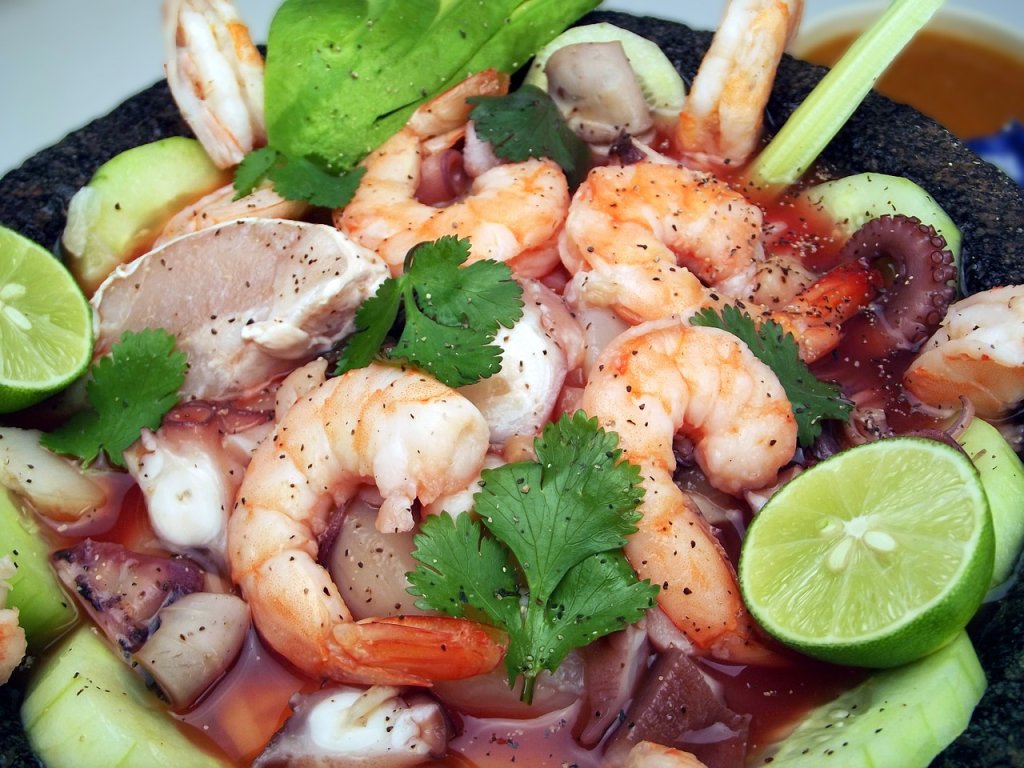
Over one billion pounds of shrimps / prawns are eaten annually in the USA, more than any other seafood. Although high in omega-3, protein, calcium, and iodine, should you be eating them if you have gout? You’ll find the answer here.
But first, what’s the difference between shrimp and prawn? Is there a difference?
The following is a summary description from Healthline.com:
Prawns v Shrimp: What’s the Difference?
“In North America, “shrimp” is used more commonly, while “prawn” refers to species that are larger or found in fresh water. Commonwealth countries and Ireland tend to use “prawn” more frequently.
Prawns and shrimp come from different branches of the crustacean family tree. Shrimp are members of the pleocyemata suborder, while prawns are part of the dendrobranchiata suborder. They have various differences in anatomy.
Prawns and shrimp reside in both fresh and salt water. However, the majority of shrimp are found in salt water while most prawns live in fresh water.
Prawns are typically larger than shrimp. However, there are exceptions to the rule — large varieties of shrimp and small varieties of prawns. Therefore, it’s hard to differentiate between the two by size alone.
There are no documented differences between the nutritional profiles of prawns and shrimp. They both provide a good source of protein, healthy fats and many vitamins and minerals, yet are low in calories.” ~ more…
Are Prawns and Shrimps Safe for Gout Sufferers?
As always when considering which foods can form part of a safe gout diet, we first have to look at their purine content:
Purines are a natural compound found in the cells of the human body and in the food we eat. Different foods have varying concentrations of purine.
During the body’s metabolic process, purines in our bodies and in the food we consume breakdown and produce uric acid as a byproduct.
High levels of uric acid in the blood — a condition called hyperuricemia — is the root cause of gout.
- More purines consumed: more uric acid produced and higher gout risk.
- Less purines consumed: less uric acid produced and lower gout risk.
In other words, gout sufferers need to manage their total purine intake from foods, which usually means completely avoiding high purine content foods, although foods with moderate amounts of purines may be consumed sparingly, whilst there is a load of low-purine food that is perfectly safe to eat.
So let’s take a look at the purine content of prawns and shrimps…
Purine Content of Prawns and Shrimps
There a many purine content tables out there that list the purine content and its uric acid equivalent for different foods and ingredients.
Unfortunately they don’t always agree with one another; there are some variances in purine numbers given for certain foods and even in how they categorize purine levels as being high, moderate or low.
But, even taking all that into account, prawns and shrimps are generally recognized as being high in purines, i.e., producing more than 200 mg uric acid per 3.5 oz (100g) food serving, with some types, such as the Oriental shrimp, producing more than 300 mg uric acid per 100g serving — according to one table at least — which is considered very high.
So, to be totally safe, we should accept that these shellfish are unsuitable for our gout diet and should be completely avoided.
And this has been confirmed in several studies. Here are the conclusions of just three of such studies that looked into the impact of seafood (and other foods) on gout risk:
“Higher levels of meat and seafood consumption are associated with an increased risk of gout, whereas a higher level of consumption of dairy products is associated with a decreased risk. Moderate intake of purine-rich vegetables or protein is not associated with an increased risk of gout.” ~ Hyon K. Choi et al.
“In this Chinese population living in Singapore, higher total dietary protein intake from mainly poultry and fish/shellfish was associated with an increased risk of gout, while dietary intake of soy and nonsoy legumes was associated with a reduced risk of gout.” ~ Gim Gee Teng et al.
“The study findings suggest that acute purine intake increases the risk of recurrent gout attacks by almost fivefold among gout patients. Avoiding or reducing amount of purine-rich foods intake, especially of animal origin, may help reduce the risk of gout attacks.” ~ Yuqing Zhang et al.
Note: My guide Gout Rescue has detailed information on high, moderate, and low purine foods and ingredients, along with daily meal ideas for gout sufferers.



